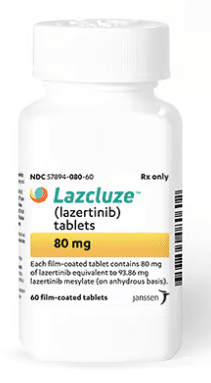Lazcluze Disease Interactions
There are 4 disease interactions with Lazcluze (lazertinib).
Lazertinib (applies to Lazcluze) ILD/pneumonitis
Moderate Potential Hazard, Moderate plausibility. Applicable conditions: Interstitial Pneumonitis
Lazertinib, which is administered in combination with amivantamab, can cause interstitial lung disease (ILD)/pneumonitis. Patients should be monitored for worsening or new symptoms indicative of ILD/pneumonitis, such as dyspnea, cough or fever.
Lazertinib (applies to Lazcluze) liver dysfunction
Moderate Potential Hazard, Moderate plausibility. Applicable conditions: Liver Disease
Lazertinib has not been studied in patients with severe hepatic impairment (total bilirubin greater than 3 x upper limit of normal and any AST).
Lazertinib (applies to Lazcluze) renal dysfunction
Moderate Potential Hazard, Moderate plausibility.
Lazertinib has not been studied in patients with severe renal dysfunction or end-stage renal disease (eGFR less than 30 mL/min).
Lazertinib (applies to Lazcluze) vision disturbances
Moderate Potential Hazard, Moderate plausibility. Applicable conditions: Visual Defect/Disturbance
Lazertinib, which is administered in combination with amivantamab, can cause ocular toxicity, including keratitis. Patients should be monitored for new or worsening eye symptoms and referred promptly to an ophthalmologist.
Switch to professional interaction data
Lazcluze drug interactions
There are 438 drug interactions with Lazcluze (lazertinib).
Lazcluze alcohol/food interactions
There is 1 alcohol/food interaction with Lazcluze (lazertinib).
More about Lazcluze (lazertinib)
- Lazcluze consumer information
- Check interactions
- Compare alternatives
- Pricing & coupons
- Drug images
- Side effects
- Dosage information
- During pregnancy
- FDA approval history
- Drug class: EGFR inhibitors
- En español
Related treatment guides
Drug Interaction Classification
| Highly clinically significant. Avoid combinations; the risk of the interaction outweighs the benefit. | |
| Moderately clinically significant. Usually avoid combinations; use it only under special circumstances. | |
| Minimally clinically significant. Minimize risk; assess risk and consider an alternative drug, take steps to circumvent the interaction risk and/or institute a monitoring plan. | |
| No interaction information available. |
See also:
Further information
Always consult your healthcare provider to ensure the information displayed on this page applies to your personal circumstances.


